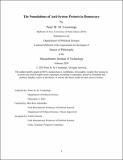The Foundations of Anti-System Protests in Democracy
Author(s)
Cummings, Peter M. M.
DownloadThesis PDF (2.062Mb)
Advisor
Schneider, Ben Ross
Terms of use
Metadata
Show full item recordAbstract
Anti-system protests in democracy are a subcategory of political protests characterized by participants from diverse sectors or groups in society, wide-ranging demands, blame directed at the political system, and a context of representative democracy. This protest subtype raises a critical puzzle: why do protesters in democracy come to blame the political system for their grievances? I argue that common explanatory theories in the protest literature – such as relative deprivation, political opportunity, and resource mobilization – provide relevant background conditions that increase the likelihood of protest onset, but these variables are unlikely to produce anti-system protests in democracy without repeated episodes of political unresponsiveness across sectors. Iterative episodes of unresponsiveness lead sectoral movement organizations to accumulate unresolved demands, to prefer extra-institutional action, and to strategically update by escalating their targets of blame to the political system. With these foundations in place, democracies become vulnerable to anti-system protests, which can then be set off by seemingly insignificant triggers. I test this argument primarily through in-depth, historical analysis of two cases: 1) Chile 2006-2019, a case in which sectoral protests escalated to anti-system protests, and 2) Brazil 2003-2013, a case in which sectoral protests escalated to multi-demand and multi-sector but non-system protests. My project challenges literature that suggests that modern protests come together rapidly due to technological advances, supports literature that urges scholars to view protests as interconnected waves of contention, and adds to literature on blame attribution by showing how and why social movement organizations escalate their targets of blame over time and based on political experiences. Lastly, my project connects to the anti-system politics literature, exploring an alternative anti-system outcome to populism.
Date issued
2024-02Department
Massachusetts Institute of Technology. Department of Political SciencePublisher
Massachusetts Institute of Technology